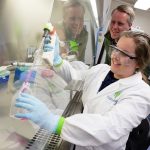|
Mentorship, guidance and financial backing from the Idaho INBRE (IDeA Network of Biomedical Research Excellence) program put Diana Mitchell’s career at the University of Idaho on a launch pad. Mitchell’s research laboratory took off from there, earning a highly competitive National Institutes of Health-funded grant to study eye repair and regeneration.
As Idaho INBRE celebrates its 25th year of continuous competitive funding, Mitchell represents one of thousands of Idaho INBRE success stories.
“The U of I-led program provides every interested and talented Idaho student and faculty member the opportunity to pursue biomedical research and education,” Director Carolyn H. Bohach said. “The goal is to increase the capacity to do human health research in our state.”
When Mitchell started at the U of I, like most faculty members, she had limited experience writing grants and had yet to gain the needed funding for her work. INBRE provided Mitchell with a technology access grant, a developmental research project, funding for numerous students and funding to upgrade her lab facility where the zebrafish for her research live. She uses these fish to study the cells that support and repair neurons in the eye. Working closely with Idaho INBRE mentors, she built a portfolio of publications that allowed her to win the coveted R01 grant from the National Institutes of Health.
“Professor Mitchell’s lab is now financially independent because of this external grant funding,” said Scott Minnich, associate director of Idaho INBRE. “Her funding allows her to support post-doctoral, graduate and undergraduate students in her lab and she’s now a mentor for other faculty members.”
In addition to faculty support, since 2001 Idaho INBRE has allowed more than 6,000 students to conduct biomedical research across all Idaho public and private institutions of higher education. The majority of those students go into the workforce in allied health professions. Others go on to graduate or professional school and their Idaho INBRE research experience prepares them well for the competitive application process.
“Students that want to go to medical school are more competitive if they have co-authored a (research) publication,” Bohach said.
Over the past quarter century, the Idaho INBRE network has helped build data science cores at Idaho State University, Boise State University and the U of I. These facilities provide access to biomedical data science resources, services and training. The cores are open to all INBRE students and faculty members and contribute to research and STEM education opportunities at BYU-Idaho, Lewis-Clark State College, Northwest Nazarene University, the College of Idaho, and Idaho’s four community colleges.
The program offers faculty seed grants each year, which has multiplied as faculty members gain competitive grant funding of their own, like Mitchell. Since 2009, Idaho INBRE’s investments multiplied about 12-fold to more than $220 million in new research grant awards.
U of I is proud to play a lead role in generating life-saving research and the skilled workforce that our state needs to improve human health. Idaho INBRE embodies our land-grant mission of delivering impactful education and research for all of Idaho.
|


